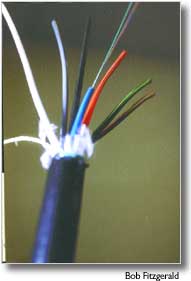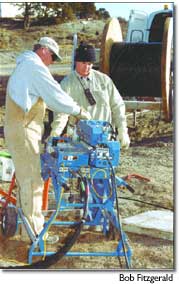|
Nov. 30, 2000 By Janelle Holden
The two telecommunications companies vying to provide fiber-optic services to the city of Cortez made their cases at a special fiber-optics work session held by the city council on Tuesday. The council, however, made no decision, opting to study the proposals further. REANET and Fone.Net were the only two companies to respond to the cityís August bid request for an administrator of the Cortez fiber-optics network. The proposed network would consist of four connected fiber-optics loops, each containing 48 strands of fiber, running at a minimum OC-3 speed. The loops would connect the city of Cortez, Montezuma County, Southwest Memorial Hospital, and the Montezuma-Cortez School District. These government entities would use 12 fiber-optics strands, while the remaining 36 would remain open for the telecommunications companies to sell to private businesses.
Private businesses would then have a full range of telecommunications services to tap into, such as video conferencing, streaming video, DS-3, wireless connection, Internet, and data/point to point in Cortez. The city of Cortez would own the fiber, but not the services. The Cortez fiber-optic network would connect to the fiber-optics lines being constructed by Pathnet from Albuquerque to Grand Junction. Pathnet expects fiber connection to be completed by next summer. The bid proposal asked the prospective companies to specify how they would provide services, how many jobs they would create, and how much they would charge for telecommunications services within the government-entity network. Mike Curtis, an independent consultant with Carter & Burgess, Inc., evaluated both of the proposals and presented his findings to the council on Tuesday. His recommendations, as well as those submitted by Alta-Telecom, and Region 9 Economic Development Council, were unanimously in favor of Fone.Netís proposal. Fone.Net is owned by eight Colorado independent telephone companies, and is headquartered in Cortez. It was the first independent telephone company in Colorado to become an Internet service provider. Initially, if Fone.Net is the successful bidder, its officials plan to budget $2 million for the next five years to hire new employees. The company plans to hire a network administrator-technical services manager and a network technician that would make between $60,000 and $80,000 a year. Fone.Net officials said that "this is not a lead-pipe cinch." If given the opportunity to supply the electronics services, they said it might be several years before the "red ink changed to black." Curtis said that Fone.Netís response was specific to the bid proposal put out by the city, whereas REANETís was not. "In place of the RFP (request for proposal) response, REANET has submitted an alternative proposal that does not provide network administration, electronics, interconnect, and management for the cityís proposed fiber-optics network. Rather, REANET proposes that the city obtain such services from their (proposed) alternate network," stated Curtis in his evaluation. "You have put us in a very awkward position," said council member Cheryl Walkenhorst. "One company has complied with the RSP; the other has said, ĎYou have no visioní." The council expressed concern that the project would soak up taxpayersí money to help build something that was going to come eventually anyway, but several members argued that implementing their own fiber-optics system would give them more control over when the services would come and what they would look like. In 1995, during a meeting held between U S West and the Region 9 Economic Development Council, U S West was asked if they could provide advanced telecommunications services within the five-county region, to stem the tide of jobs the region was losing for lack of service. U S West said there was nothing it could do, and, in response, two rural electric cooperatives, Empire and La Plata Electric, helped to form REANET, a local telecommunications company committed to bringing a fiber network to rural areas. In addition, state legislation made grant money possible for communities to provide governmental entities with fiber-optic services. Neal Stephens, general manager of Empire Electric, said that the cooperatives did not form REANET to "make a profit," but rather to help the regionís economic development. "Weíre looking at this not only as a business probability, but we do see this as a benefit to the community in many ways," said Michael Brinks, chief operating officer of REANET. Councilman Jim Herrick said he would be satisfied if the current telecommunications companies could provide consistent basic telephone services to the region. "I canít even call Durango in the middle of the day," complained Herrick. |
||||
|
Copyright © 2000 the Cortez Journal.
All rights reserved. |

